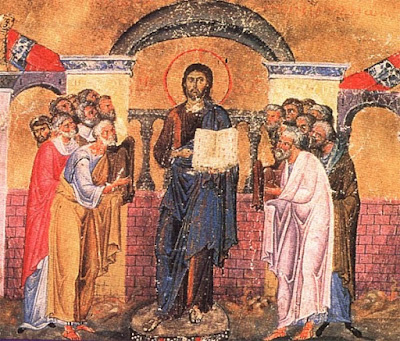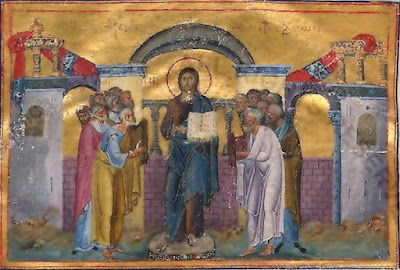
On the first of September is the beginning of the Indiction, namely the New Year.
Verses
Bless for us the Indiction of the New Year,
O You Who are both Ancient and for mankind New
(namely You, O Christ).
We should know, brethren, that the Holy Church of God celebrates today the Indiction, for three reasons…
First, because it is the new year, and many of the old Romans honored it from ancient times. In Latin the word Indiction means “boundry.”*
Second, the Church celebrates because on this day our Lord Jesus Christ went to the Synagogue of the Jews, and was given the Book of the Prophet Isaiah, as Luke the Evangelist writes (Lk. 4). And when the Lord opened the scroll – O the wonder! – He found that place, namely the sixty-first chapter of Isaiah, in which it says the following words: “The Spirit of the Lord is upon me, because he has anointed me to proclaim good news to the poor. He has sent me to proclaim freedom for the prisoners and recovery of sight for the blind, to set the oppressed free, to proclaim the acceptable year of the Lord.” When the Lord read these words, He rolled up the scroll and gave it to the attendant. Then He sat down and said to the people: “Today the words of this prophecy have been fulfilled in your hearing.” Hearing this, the people were astounded by these graceful words which came out of His mouth, as Luke the Evangelist writes.**
There is also a third reason why the Church remembers the Indiction today, and celebrates the beginning of the new year: that is, in the hymns and prayers which we offer to God on this feast, we ask that God be gracious to us and bless the new year, and that He grant it prosperity and full of all the physical good things. And that He illumine our intellects, that we pass the entire year in purity and with a good conscience, and that we be well pleasing to God by keeping His commandments, so that by this we may acquire eternal heavenly good things.
Notes:
* The indiction was a proclamation made every fifteen years in the later Roman Empire, fixing the valuation of property to be used as a basis for taxation. This cycle of fifteen years began during the reign of Constantine the Great in 313 A.D. By the late fourth century it was being used to date documents throughout the Mediterranean. In the Eastern Roman Empire outside of Egypt, the first day of its year was September 23, the birthday of Augustus. During the last half of the fifth century, probably 462, this shifted to September 1, where it remained throughout the rest of the Roman Empire till 1453, and used in places beyond this time until the 16th century. In 537, Justinian decreed that all dates must include the indiction via Novella 47, which eventually caused the Roman year to begin on September 1.
** Some believe that this event took place in the second year of the Lord’s ministry, since first He performed the miracle at Cana, then He spoke with the Samaritan woman at the well, then He preached the gospel of the kingdom in Galilee, and after working many signs in Capernaum, He went to Nazareth where He made this proclamation.
Apolytikion in the Second Tone
Lord of the universe who by Thy power hast established the times and seasons, bless this year with Thy goodness, preserve our rulers and keep Thy flock in peace, through the prayers of the Mother of God, and save us.
Kontakion in the Fourth Tone
Creator and Lord of the ages, God of all, transcendent in essence: Bless this year. Save all who worship and cry: Grant us a fruitful year, O Compassionate Redeemer.
